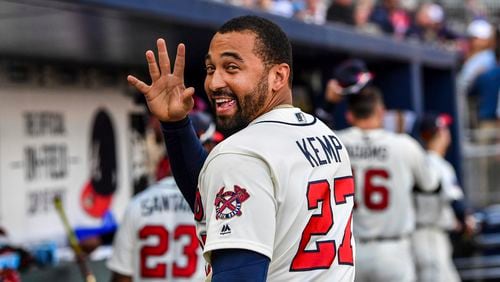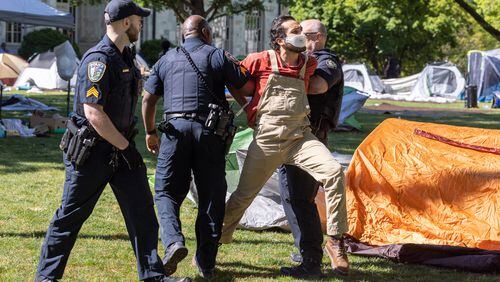After 75 games last season, the Braves were 26-49, holders of last place in their division (17 ½ games out of first) and owners of the second-worst record in the majors. Through 75 games, the 2017 Braves are 36-39, holders of second place (nine games out) and owners of the seventh-best record in the 15-team National League.
This season hasn’t quite gone to script. (Seasons rarely do.) The rotation, built to eat innings, has the sixth-worst ERA in baseball. Dansby Swanson, Face of the Franchise, hit .156 in April and .216 in May. Jim Johnson, closer, has five blown saves; only two big-leaguers have more. Freddie Freeman, cornerstone, hasn’t played since the fifth inning of Game No. 27. Before the homestand that ended Sunday, the Braves were 13-19 at SunTrust Park.
And yet: Had they won Sunday, they’d have been within a game of .500, a space the Braves haven’t occupied this deep into a season in nearly two years. On July 7, 2015, they were 42-42. They would finish 67-95. Over the first 76 games of 2016, they were 26-50. From Game No. 85 of 2015 through Game No. 84 of last season, the Braves were 53-109. They were, in a word, horrendous. Those 162 games now seem the bottom.
The Braves’ rebuild began in earnest on Nov. 17, 2014, when the newly appointed front office of John Hart and John Coppolella sent Jason Heyward to St. Louis for Shelby Miller. Many trades would follow, nearly all of the old-for-young/expensive-for-cheap ilk. When you tear down a team, you gird yourselves for the absolute worst, at least at the major-league level. We got that, but we got it in half-doses.
As bad as the Braves were in the second half of 2015 and the first four months of 2016, they didn’t lose 100 games in either season. (They lost 95 and 93, respectively. Still: Not 100!) They probably won’t lose 90 this time. Contrast this with Houston’s ballyhooed teardown – 106 losses in 2011, 107 in 2012 and 111 in 2013. Over those three seasons, the Astros finished an aggregate 127 games out of first place. They also netted the No. 1 overall pick three years running.
Today the Astros are 52-25. They're on pace to win, as opposed to lose, 109 games. It took a while, but they've got it going. It hasn't taken the Braves nearly as long, but they appear within sight of getting it going. As this correspondent conceded to Coppolella two weeks ago: This looks like a ballclub now.
Yes, there’s a catch. The Braves as we see them aren’t the Braves they’ll be. Four of the eight everyday positions – counting both halves of the catching platoon; not counting Adonis Garcia, who may have lost his tenuous hold on third base to Johan Camargo – are manned by over-30 types, all of whom were acquired from other organizations. Even with Bartolo Colon still on the disabled list, only one of the Braves’ starting pitchers is under 25. (Meaning Sean Newcomb, who just arrived.) We can’t render a verdict on the up-from-oblivion minor-league system because so few prospects are here yet. Which isn’t a bad thing. On the contrary.
We can, however, say this: Coppolella is an ace at acquiring affordable assets. Witness the catching tandem of Tyler Flowers and Kurt Suzuki. The Braves are paying them $4.5 million this season. They've got a collective Baseball-Reference WAR of 2.2 Compare that to Matt Wieters, who signed with Washington for $10.5 million and has delivered a minus-0.1 WAR. Or to Jonathan Lucroy, for whom every team (Braves included) without Buster Posey sought to trade and who's now with Texas. He's making $5.25 million and is due to become a free agent. His WAR is 0.2. And Posey himself? He has a 2.7 WAR. He's also making $21.4 million.
The Braves don’t plan to rely on retreads much longer, but the ability to scrounge should never be underrated. That ability has made what was always going to be a difficult process milder and briefer than even the Braves could have dreamed. Lest we forget, they considered themselves a contending team as of Labor Day 2014. Now consider the Phillies. Since 2012, they’ve lost 89, 89, 99 and 91 games. They’re on pace to lose 99. Philadelphia finished 2 ½ games ahead of the Braves last season; it’s 10 ½ behind them now.
By the time the Braves return to STP on the Fourth of July, they could again be nuzzling up to .500. This road swing features games against San Diego and Oakland, two of the worst teams in the majors. This time a year ago, the Braves were a similarly motley crew. They’re not anymore.
Their record could take a dip soon – with the Braves’ playoff odds still negligible, Coppolella’s going to sell somebody – but he’s not going to sell everybody. He has a farm system now. He has a ballclub. The worst is behind the Braves. In the grand scheme, the worst wasn't even that bad.







